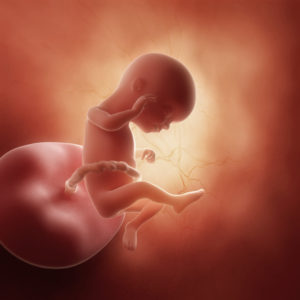My Second Trimester
Week 16
Estimated Reading Time: 3 minutes Your baby’s ears are now in their permanent location. Tiny eyes, complete with eyelashes, are now facing straight ahead. While your baby’s eyes do not open at this time, they can move from left to right and see light. Little hiccups may now become a part of your baby’s experience in utero this week.
Your baby’s ears are now in their permanent location. Tiny eyes, complete with eyelashes, are now facing straight ahead. While your baby’s eyes do not open at this time, they can move from left to right and see light. Little hiccups may now become a part of your baby’s experience in utero this week.
You will not be able to feel your baby’s movements at this time although they are becoming synchronized due to the connections between the skeletal and nervous systems. If you have an ultrasound assessment at this time, your baby’s movements will be easily identified. As your baby’s reflexes strengthen, the facial muscles enable peeking, defiant stares and possibly sucking motions that are the beginning of the sucking reflex needed on delivery day for nursing. With back muscles becoming stronger, your baby’s position can now be uncurled slightly.
If you are having a baby girl, she continues developing millions of tiny eggs this week within her petite ovaries. Ultimately, this miraculous development will allow your baby girl to become a “mom” herself one day and raise her own precious babies.
Your baby is now the size of the perfect avocado and just a little more than 4½ inches long.
Fetal Hiccups
 Babies love to hiccup! Light, recurring and sequential patterns are what you will notice at first. Later in your pregnancy, your baby’s hiccups will become robust and recognizable. Although most babies have hiccups and they are harmless, some fetal hiccups may be a reason for concern. According to Obstetrician-Gynecologist Dr. Jason Collins, MD, MSCR, of The Pregnancy Institute, even though your baby’s hiccups can be recurrent, once the Week 32 gestational marker is reached, your baby’s hiccups should lessen and not be present on a daily basis. So, when your baby continues to hiccup every day with hiccups lasting longer than 15 minutes or a series of hiccups 3–4 times with 24 hours, alert your health care team and have your baby evaluated for possible umbilical cord concerns.
Babies love to hiccup! Light, recurring and sequential patterns are what you will notice at first. Later in your pregnancy, your baby’s hiccups will become robust and recognizable. Although most babies have hiccups and they are harmless, some fetal hiccups may be a reason for concern. According to Obstetrician-Gynecologist Dr. Jason Collins, MD, MSCR, of The Pregnancy Institute, even though your baby’s hiccups can be recurrent, once the Week 32 gestational marker is reached, your baby’s hiccups should lessen and not be present on a daily basis. So, when your baby continues to hiccup every day with hiccups lasting longer than 15 minutes or a series of hiccups 3–4 times with 24 hours, alert your health care team and have your baby evaluated for possible umbilical cord concerns.
Intrahepatic Cholestasis Of Pregnancy (ICP)
 Although some itching in pregnancy is normal, if you notice itching, primarily at night on the palms of hands, arms, legs, soles of feet or all-over itching which typically increases in severity, speak with your health care team. Intrahepatic Cholestasis of Pregnancy (ICP), a liver disorder occurring during pregnancy, affects 1 – 2 women per 1000 with itching being the most common symptom. While ICP has been reported early on in pregnancy by some individuals, it commonly begins in the third trimester when hormone concentrations peak.
Although some itching in pregnancy is normal, if you notice itching, primarily at night on the palms of hands, arms, legs, soles of feet or all-over itching which typically increases in severity, speak with your health care team. Intrahepatic Cholestasis of Pregnancy (ICP), a liver disorder occurring during pregnancy, affects 1 – 2 women per 1000 with itching being the most common symptom. While ICP has been reported early on in pregnancy by some individuals, it commonly begins in the third trimester when hormone concentrations peak.
Two simple blood tests will determine if you could possibly have ICP. ICPcare.org: For women and families that experience Intrahepatic Cholestasis of Pregnancy, provides pertinent educational information, the risks of the disorder ranging from fetal distress to an increased risk of intrauterine fetal demise (stillbirth) and a letter explaining ICP to your health care provider. For additional information on ICP and how it could possibly impact your pregnancy, please visit ICPcare.org.